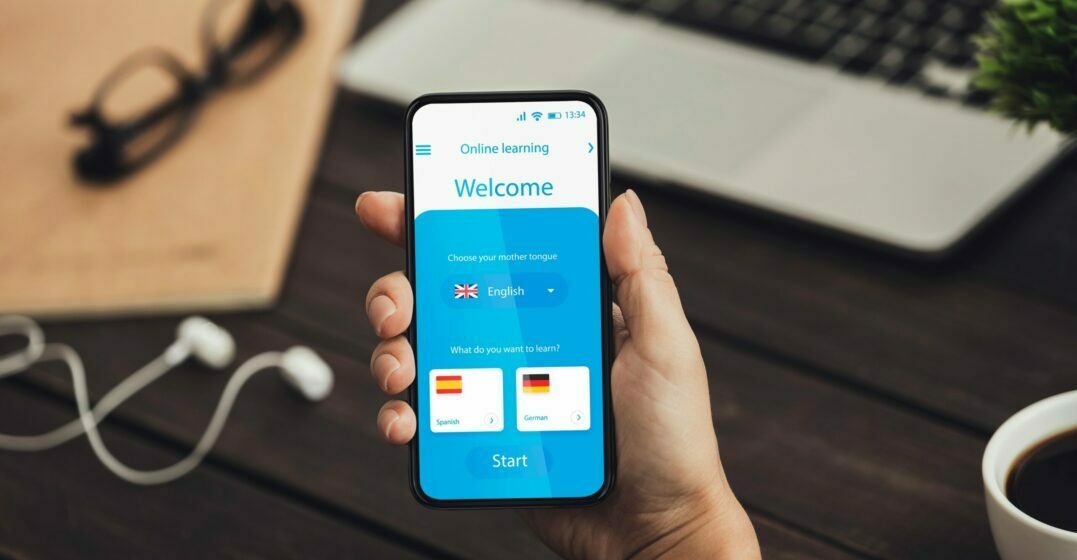6 best apps to learn German

Are you looking for the best app to learn German? There are hundreds of language learning apps out there and the choice can be a little overwhelming. Some are designed to improve your vocabulary and grammar, others might focus on listening, reading and even speaking skills.
You’re probably familiar with Duolingo and several other big language-learning apps out there, so let us introduce you to some of our picks for great German language learning apps that you might not have heard of.

Begin your personal language journey
- Courses tailored to your learning needs
- Qualified native-level teachers
- Expert-designed curriculum
- Live classes with small group sizes


Lingoda’s vocabulary list
Unlike traditional language apps, Lingoda provides live classes with qualified native-speaking teachers. You will gain confidence in your language skills through regular practice and feedback. So why not consider Lingoda as an alternative to apps? If you’re taking German classes with Lingoda, make sure you’re using the new vocabulary list feature to boost your pre- and post-class learning. Before your classes, you’ll be able to get prepared by looking at the upcoming vocabulary items. Then, after class, you can review any new vocabulary at your own pace. For each word, you can see the word class, gender, a translation and an example of how to use the word in context.
1. Drops
If you love flashcards but don’t love having hundreds of pieces of paper around, download Drops. It’s brightly colored and works as a game so you can have fun while learning German vocabulary. Using Drops, you’ll first see and hear a word in German and English with an image. Then, while you’re practicing, you’ll need to match the word in German to the correct image.
A major reason why Drops’ virtual flashcards beat homemade ones is that the app uses science to help you learn vocabulary. The spaced repetition system shows you new words more frequently and older ones less often so you learn efficiently. There is a free version of Drops but for €5 per month for a year you can get rid of the adverts and have unlimited access.
2. Memrise
Memrise is the second flashcard-based app on the list and while it might not be as visually stunning as Drops, it does have some extra features that make it one of the best apps to learn German for free. The vocabulary part is similar to Drops in that it uses spaced repetition to optimize your language learning and there are pictures to help you remember words.
Other elements of the app you might like are the short video clips that are designed to help improve your listening skills. And the best thing? Memrise is an app to learn German for free as the basic version is so good that there’s no need to pay for it.
4. Der Die Das
The dreaded German articles are often pretty challenging to remember so let the free app Der Die Das help you out. This app is incredibly simple (thankfully, as the topic is tricky enough already!). You enter a word and Der Die Das will show you the gender and which article to use.
The app also has a simple game feature to help you review the genders of some of the 17,000 nouns in its dictionary. And, it gives you tips and tricks to try to recognize the gender of a noun when the app isn’t around - let’s be honest, you can’t constantly pull it out mid-conversation, sadly.

Begin your personal language journey
- Courses tailored to your learning needs
- Qualified teachers, small class sizes
- Expert-designed curriculum
- Live classes with native-level teachers


5. Tandem
Looking for an app to learn to speak German? Check out Tandem and find a German native speaker to practice with. This language exchange app lets you build a profile and then search for language partners that you’d like to chat to so you can learn to speak like a native.
You can choose how to interact with your exchange partner as the app allows you to voice message, chat or video call someone. In exchange for you getting to talk in German, you’ll be teaching someone else your native language too.
6. DW Learn German
From the broadcaster Deutsche Welle, DW Learn German is one of the top apps to learn German for beginner and intermediate students. After taking a placement test to make sure you’re at the right level, you’ll be able to choose a course and watch entertaining videos and complete exercises to improve your grammar and vocabulary. You’ll be regularly tested to make sure you understand what you’re learning.
Deutsche Welle also has some great podcasts on a massive range of topics that you can find on their website.
7. Bravolol
Our final recommendation is for you to download a dictionary app like Bravolol. It works similarly to a paper dictionary, but better (and it’s way more convenient to carry around!). It has definitions of words and example sentences, lets you listen to the pronunciation of new words and gives you a search history so you can review your new vocabulary. It’s a super handy tool to keep next to you when you’re reading a book or listening to something in German.
Which German language app are you going to try?
Hopefully, you’ve been inspired to download an app to give you an extra tool in your language-learning kit. Whether you want to add to your vocabulary bank with Drops or find a native speaker to practice with on Tandem, with regular use, these apps are sure to help you improve your German language skills.















